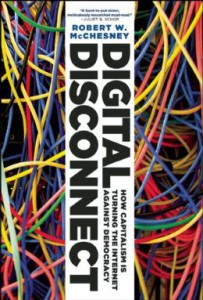Digital Grab: Corporate Power Has Seized the Internet
Norman Solomon
Ethical Technology
Posted: Jun 14, 2013
If your daily routine took you from one homegrown organic garden to another, bypassing vast fields choked with pesticides, you might feel pretty good about the current state of agriculture. If your daily routine takes you from one noncommercial progressive website to another, you might feel pretty good about the current state of the Internet. But while mass media have supplied endless raptures about a digital revolution, corporate power has seized the Internet—and the anti-democratic grip is tightening every day.
“Most assessments of the Internet fail to ground it in political economy; they fail to understand the importance of capitalism in shaping and, for lack of a better term, domesticating the Internet,” says Robert W. McChesney in his illuminating new book, Digital Disconnect.

Plenty of commentators loudly celebrate the Internet. Some are vocal skeptics. “Both camps, with a few exceptions, have a single, deep, and often fatal flaw that severely compromises the value of their work,” McChesney writes. “That flaw, simply put, is ignorance about really existing capitalism and an underappreciation of how capitalism dominates social life. . . . Both camps miss the way capitalism defines our times and sets the terms for understanding not only the Internet, but most everything else of a social nature, including politics, in our society.”
And he adds: “The profit motive, commercialism, public relations, marketing, and advertising — all defining features of contemporary corporate capitalism — are foundational to any assessment of how the Internet has developed and is likely to develop.”
Concerns about the online world often fixate on cutting-edge digital tech. But, as McChesney points out, “the criticism of out-of-control technology is in large part a critique of out-of-control commercialism. The loneliness, alienation, and unhappiness sometimes ascribed to the Internet are also associated with a marketplace gone wild.”
Discourse about the Internet often proceeds as if digital technology has some kind of mind or will of its own. It does not.
For the most part, what has gone terribly wrong in digital realms is not about the technology. I often think of what Herbert Marcuse wrote in his 1964 book One-Dimensional Man: “The traditional notion of the ‘neutrality’ of technology can no longer be maintained. Technology as such cannot be isolated from the use to which it is put; the technological society is a system of domination which operates already in the concept and construction of techniques.”
Phi Beta Iota: Put quite simply, Open Source Everything (OSE) and the Autonomous Internet are the foundations for liberty in a digital world.
See Also:



